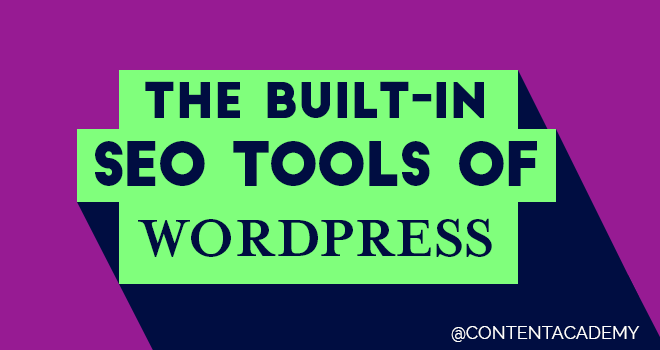
Over 2 million blog posts are published each day, which represents an unreal amount of content for a search engine to sift through and recommend to those searching for answers to their questions. As a blogger, in order to even get to the point where Google begins recommend your posts, your site must first be optimized properly.
The process of optimizing a website for search is called Search Engine Optimization or SEO for short. The process is often technical and strategic in nature but, at the very minimum, SEO includes techniques to guide a user to your website through various forms of content such as blog posts. One of the most popular ways to get your name out on the web is with blogging and WordPress is both a service and a tool that can help you accomplish that with a lot of built-in functionality that conducive to better SEO.
Here are the built-in SEO tools on WordPress.
WordPress Makes it Easy to Submit to Search Engines
WordPress.com’s relatively new SEO Settings Panel takes care of a number of technical SEO needs, including:
- Front page meta description
- Site Verification Services
- XML Sitemap
Self-hosted WordPress users can also find this type of functionality with many great SEO plugins including Yoast SEO but it’s not technically needed. WordPress will automatically use to use your website’s tagline as the meta description for a blog. This front page meta description update makes it possible to use more keyword-rich text.
Site verification services make it easy to manage third party webmaster tools, including:
- Google Search Console
- Bing Webmaster Tools
- Pinterest Site Verification
- Yandex Webmaster
The XML Sitemap feature automatically generates a list of the pages on your site and tells Google how they’re connected. Combined with WordPress’s ability to automatically generate a robots.txt file, these technical elements are necessary for strong SEO.
If you’re self-hosting WordPress, you can still access these features by installing Jetpack.
Mobile Responsiveness
One of the main contributing factors to SEO is the ability to view and use a blog on a mobile device. Google has a tool that shows you how it interprets your blog and gives advice on how to improve the user’s mobile experience. For the technologically unsavvy, most themes offered for WordPress include mobile responsive options. Make sure to test out your theme of choice for this functionality before marrying yourself to it!
Page Load Time
Page load time is another extremely important factor when trying to rank on search engines. This has to do with the fact that people who grow impatient waiting for a page to load may leave before seeing your content or advancing to another page. By not visiting another page (a signal of interest), Google records a high bounce rate. A high bounce rate is interpreted by Google as a mismatch as the ideal search result.
Quicksprout also points out that WordPress code is without bloat (unnecessary white space, elements, etc.), which means it supports fast page load time. Of course, any WordPress blog can be slowed down with excessive use of plugins, images, and bad choices in general – so be careful what you’re adding to your WordPress blog.
Yoast SEO
Perhaps the single most useful plugin for self-hosted WordPress sites (at least as far as SEO is concerned) is the Yoast SEO plugin. Yoast provides a stoplight style list of to-dos regarding implementing keywords: green means go, red means you have some work to do. Yoast SEO takes what could be considered a complicated process of implementing on-page SEO and makes ranking for specific keywords accessible for everyone.
There are certainly other nuances and specifications that lend the WordPress software to being an easy way to win at SEO, but this list can help you understand the most important factors for ranking.
To learn more about WordPress and it’s powerful features for bloggers, check out our article about Jetpack, or plugin roundup posts, and of course, our step-by-step courses on learning how to use the WordPress software.
What are you most excited about regarding the built-in SEO tools on WordPress? Let us know your thoughts in the comments!

And what about WP security?
I am really glad to read your amazing and marvellous post. It was my pleasure to read your post. Thank you for sharing such a wonderful post
I found your suggestions very reassuring and incredibly common-sense-useful! I loved this post, and I’m definitely pinning it to share